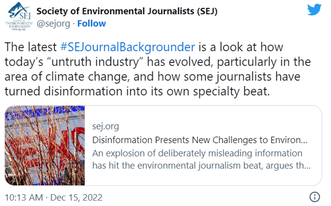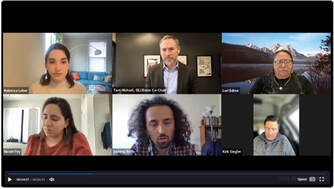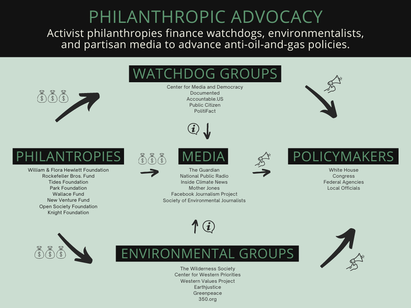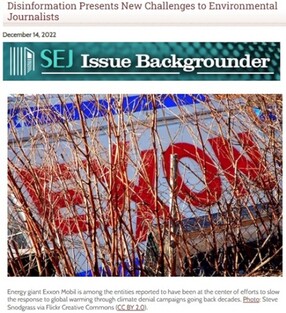Climate Reporters Push Prohibition of Oil and Natural Gas Voices A leading group of climate journalists is campaigning in 2023 to weaponize claims of “disinformation” and bar voices supporting oil and natural gas from news stories. Ironically, based on their own standards these reporters are advancing disinformation of their own. The Society of Environmental Journalists (SEJ), an association of 1,400 reporters that’s funded in large part by billion-dollar, anti-fossil fuel philanthropies, recently kicked off a campaign to promote its “2023 Journalists’ Guide to Energy & Environment.” As an extension of the campaign, SEJ and its leaders are pushing reporters across the country to exclude views that run counter to theirs in climate stories. The following highlights several recent comments by SEJ leadership and its members.  Science is Hard, But Misinformation is Easy Kicking off the campaign, SEJ hosted a training webinar last week featuring reporters from NPR’s national desk, Vox, the L.A. Times, and Boise State Public Radio. SEJ board member and Vox reporter Rebecca Leber tackled the recent controversy around bans on natural gas stoves following statements by a member of the federal Consumer Product Safety Commission. Leber’s stated goal as an SEJ leader is to “broaden this out beyond this blowup we saw” and to “look at all of the other kinds of problems and solutions and misinformation circulating around this issue.” Targeting misinformation is easy for Leber. Despite tepid acknowledgement that “it can be really hard to parse what is real, what is fiction, and how to interpret the scientific studies,” she’s quick to take sides. She noted, “There's also lots of misinformation going around, a lot propped up by gas utilities that have a stake in whether the economy is making this energy transition.” She went on to caution against elevating industry sources, stating, “It turned out that some of these voices that you might often see in some articles, or just loudly on social media who are the biggest protesters against electrification campaigns, some of these people have direct ties and financial interests in the gas industry. They either paid for these posts or there is other kinds of connections, like trade groups that are working with the gas industry.” She concluded, “So I think in exposing these campaigns, it can really tell us a lot about how social media can be weaponized here to oppose climate policy as well. I think it's something that journalists have to be on guard in our reporting, because this is a huge source for disinformation.”  “You can’t handle the truth!” Echoing her comments, panel moderator Tom Michael of Boise State Public Radio assertively stated, “As these pressure groups are obviously going to ramp up, it’ll be incumbent on us as journalists to be able to find the truth.” We agree! Based on the standards presented by Leber, the truth that should be reported on campaigns to ban natural gas stoves is climate activist groups are colluding with each other. Notably, the Rocky Mountain Institute (RMI), which conducted an often-cited study on indoor air emissions that’s used to advance such bans, was a key participant in a 2019 secret summit of activist groups, local elected officials, and dark money groups that plotted out these campaigns. The Alliance’s Western Wire unearthed the details when mainstream media did not. Additionally, it should be reported that SEJ, Vox, and RMI are financially tied together by a network of billion-dollar activist philanthropies—including the ClimateWorks Foundation, Rockefeller Foundation, William and Flora Hewlett Foundation, and many others—that fund unreliable science, lobbying campaigns, and partisan journalism. The truth is media tied to this network aren’t going to self-report on their own conflicts of interest. Dissenting Voices are Red Herrings L.A. Times climate reporter Sammy Roth addressed a question during SEJ’s webinar about the responsibility journalists have in including dissenting voices in stories, particularly from “lobbyists and these pressure groups.” Roth pointedly said, “I definitely don't include climate denial voices in my stories,” and called them “red herrings.” Lumped in with climate deniers, he boasted about excluding “what you hear from the oil and gas industry and politicians that are aligned with them. You know, interest groups that are pushing a real fossil fuel narrative to the extent that they're making arguments that are clearly out of line with what the science says is necessary.” Roth went on to advocate for excluding sources that say, “a climate future is still compatible with continued new oil and gas extraction projects that, you know, that there's no feasible way to you know, to reorient an economy without fossil fuels.” Based on these standards, Roth also shouldn’t cite federal agencies under the Biden Administration, such as the Energy Information Administration, that report oil and natural gas consumption will continue to increase to at least 2050.  Malarkey As part of SEJ’s reporter education campaign, the group also compiled a lengthy special report. It’s full of how-to tip sheets like an SEJ Issue Backgrounder entitled, “Disinformation Presents New Challenges to Environmental Journalists.” SEJ Editorial Advisory Board member and editor Joseph Davis wrote the piece, and he claims pro-oil-and-natural-gas sources are “malarkey.” He writes, “A lot of the sources available in the public sphere are blowing smoke. As well as emitting it. Disinformation is a big challenge for environmental journalists.” He compares the old days when “who-what-where journalism was often enough” to today’s environment where “there seems to be much more information that is untrue, intentionally misleading … and generously paid for.” As a solution, he advocates for only including favorable climate sources in stories by cautioning writers against being “both-sides journalists.” In light of these claims, I recently wrote a letter to the association highlighting concerns we have about SEJ’s campaign. I highlighted the fact that science developed by our industry is the work of tens of thousands of diverse scientists and engineers, and I called on the association to avoid promoting extremes in news reporting. SEJ editor Adam Glenn responded, stating, “What we publish in SEJournal Online does not represent the views of the Society of Environmental Journalists, but rather the voices of independent journalists who generally have extensive experience in this field.” So despite the fact that the document was published under the masthead of the professional association, it was written by an SEJ-compensated writer, and posted on SEJ’s website, he’s claiming the material doesn’t represent the views of his organization. The claim, of course, is disinformation.
0 Comments
Your comment will be posted after it is approved.
Leave a Reply. |
Archives
June 2024
Categories |


 RSS Feed
RSS Feed